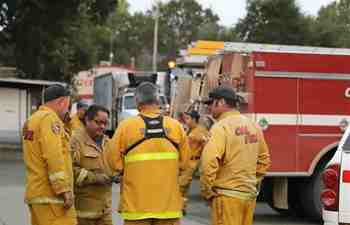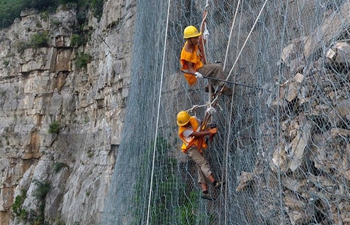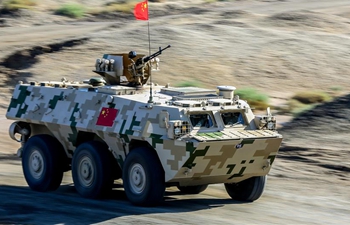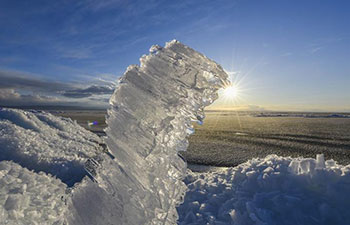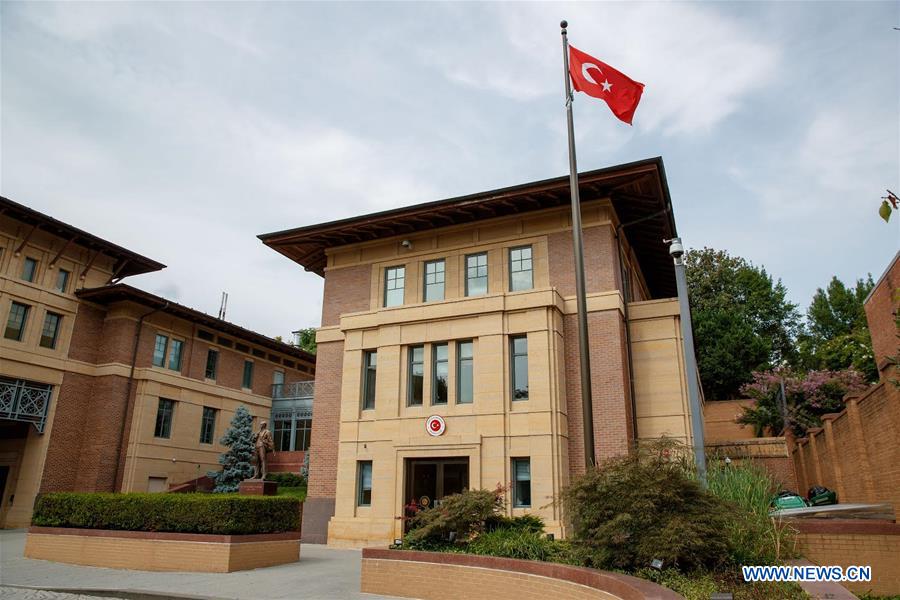
Photo taken on Aug. 10, 2018 shows Turkish Embassy in Washington D.C., the United States. U.S. President Donald Trump tweeted Friday that he has authorized to double the tariffs on steel and aluminum products from Turkey to 50 percent and 20 percent respectively. The White House has since confirmed the tweet. (Xinhua/Ting Shen)
by Xinhua writers Zhu Dongyang, Matthew Rusling
WASHINGTON, Aug. 10 (Xinhua) -- U.S. experts say President Donald Trump's tweet on Friday stating that he has authorized doubling the tariff on steel and aluminum imports from Turkey will further destabilize the Turkish economy and put ties between the two countries in a "real dilemma."
"I have just authorized a doubling of Tariffs on Steel and Aluminum with respect to Turkey as their currency, the Turkish Lira, slides rapidly against our very strong Dollar!" Trump tweeted. Washington's relations with Ankara "are not good at this time," he added.
The updated sanctions will raise Turkish steel tariff to 50 percent and aluminum tariff to 20 percent.
The escalation came after Washington's ultimatum for Ankara to release and repatriate American pastor Andrew Brunson, detained in Turkey since 2016, lapsed on Wednesday, despite intense diplomatic engagement over the last week.
Brunson was charged with involvement in a failed coup attempt against President Recep Tayyip Erdogan's government in 2016. Transferred from detainment to house arrest last month, he could face up to 25 years in jail if found guilty.
The United States has denied Turkey's request for deporting Fethullah Gulen, a U.S.-based Turkish cleric who Ankara says is the main perpetrator of the 2016 coup.
David Pollock, a senior fellow at the Washington Institute for Near East Policy, told Xinhua that the sanctions derived not from an economic reason, but a foreign policy one.
The Brunson case has enraged the Evangelicals in the United States, who constitute a critical electoral base for Trump. Pollock said the new tariff decision appeals to Trump's political base.
Turkey is the world's eighth largest steel producer and according to a June report by the U.S. Commerce Department, the seventh largest source of U.S. steel imports.
The metal tariffs, Pollock said, "will have a real impact on Turkey, more than you might expect."
Ian Bremmer, head of the New York-headquartered think tank Eurasia Group, called the sanctions "an example of the short-term tough line this administration is willing to take."
"Big impact. No regard for long term consequences. Hope he never needs a helping hand from anyone," Bremmer tweeted on Friday.
Experts have been questioning the real intention of U.S. tariffs, which are based on Section 232 of the Trade Expansion Act of 1962, a domestic legislation that justifies the imposition of duties over national security concerns.
"(Section 232 is) being employed more in a punitive sense rather than protecting a U.S. industry for the sake of national security," said Dan Mahaffee, senior vice president and director of policy at the Center for the Study of the Presidency and Congress.
Pollock said by ratcheting up economic sanctions against Turkey, an American ally in the North Atlantic Treaty Organization (NATO), Washington has put itself in a "real dilemma" with Ankara.
"We are exercising economic leverage against Turkey but we're also damaging our own alliance structure in NATO. So there's no easy answer, it's a real dilemma," he said.
Noting that Turkey is moving away from NATO allies and toward Russia and Iran, Mahaffee said, "The clash of personalities between Trump and Erdogan might be more than enough to split the historic alliance."
Edward Price, a former Central Intelligence Agency (CIA) officer who retired from the CIA refusing to work for the Trump administration, said the administration, in order to bring back Brunson, should fill the vacant U.S. ambassador's post in Turkey instead of levying tariffs that will ultimately have to be borne by Americans.
Price said on Twitter: "Before slapping a NATO ally and vital counter-ISIS (Islamic State of Iraq and Syria) partner with tariffs -- which US consumers will pay for -- the Trump administration would've been wise to name an Ambassador to Turkey. Or have in place a Hostage Envoy. Both steps could've helped secure Pastor Brunson's release."


